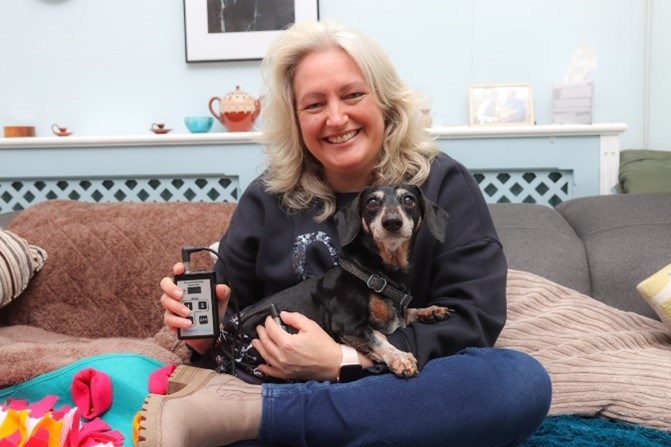
Wally Wags was diagnosed with Intervertebral Disc Disease at the age of four
13yr Old Dachshund Saved By Sacral Nerve Implant
The devoted owner of a paralysed 13yr old dachshund has praised Bristol Vet Specialists' neurology specialist Nicolas Granger for saving her dog’s life thanks to a sacral nerve implant – a technique he co-developed from human medicine.
Wally Wags was diagnosed with Intervertebral Disc Disease (IVDD) at the age of four, which is a condition that can cause excruciating pain and mobility issues for dogs, particularly those of certain breeds like Dachshunds, Beagles, and French Bulldogs. This condition involves the degeneration of discs in the spinal column, leading to sudden spinal cord compression, inflammation, and in severe cases, paralysis.
Despite surgeries on his spine, Wally eventually lost the use of his back legs, along with the ability to empty his bladder without assistance.
His owner Jennifer said: “It took us about 6 months to learn the technique of how to locate the bladder and manipulate it in the correct way. Wally didn’t enjoy it, I didn’t enjoy it and it was so difficult to teach anyone else that eventually I couldn’t go to work.”
But unfortunately, that wasn’t the main issue with Wally’s condition. Jennifer continued: “The real problem was that Wally kept getting UTI’s (urinary tract infections) which became more and more serious. That’s when my vet suggested speaking to Nicolas Granger at Bristol Vet Specialists who could possibly offer Wally a sacral nerve implant.”
This procedure, developed by Dr. Nicolas Granger and Prof. Nick Jeffery during a research project at Cambridge University is currently only carried out at CVS' Bristol Vet Specialists by Dr Granger and at Texas A&M in America by Prof. Jeffery. It works through an implant delicately placed in the lumbar spine near the nerves controlling the bladder. The implant, and therefore the nerves, can then be activated by a remote unit placed on the dogs back above the spine.
By using this device, owners can ensure that their pet’s bladder can be emptied fully, hugely simplifying the process and massively reducing the risk of the animal contracting an infection.
Nicolas Granger who is head of neurology and neurosurgery and Bristol Vet Specialists said: “We know that animals with severe spinal cord injuries will go on having infections of the urine possibly because the bladder is not emptied fully, and these can spread to the kidneys and lead to very severe problems, which was the worry with Wally.”
He added: “Having developed and applied this procedure over the last 10 years we know that it is very safe and dogs that do have the implant enjoy a very healthy life. Wally is testament to that having had the implant now for over 6 years and still has a great quality of life.”
Wally’s owner Jennifer is certainly happy with the outcome saying: “As a health benefit for Wally, it’s just immeasurable and honestly I don’t think he’d be here if we hadn’t had this implant, it’s been amazing. I could’ve lost my dog at age 5 and now he’s coming up to 13 and he’s still really got a lust for life!”
To find out more about sacral nerve implants and other specialist treatments offered at Bristol Vet Specialists visit www.bristolvetspecialists.co.uk .
More from CVS UK Ltd
- Chestergates Veterinary Specialists launches Specialist Dermatology Service
- CVS launches Life Stage Assessment Clinical Improvement Project to champion pet wellness
- Chestergates Veterinary Specialists strengthens surgical team with appointment of Specialist Matthew Smith
- Precise imaging and unconventional fixation resolve challenging tarsal fracture
- CVS Farm Vets launches innovative Sheep Lameness Project to support UK farmers

 2 years ago
2 years ago  973 views
973 views